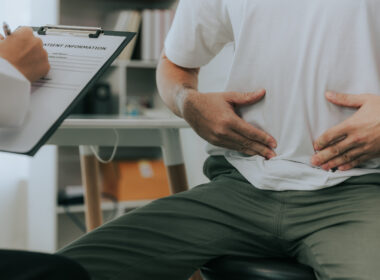Many people know Lisa Hendrickson-Jack as the creator of the most popular podcast on fertility health, Fertility Friday. Others know her from her pivotal book The Fifth Vital Sign. Still others know her for her one-on-one coaching in navigating the challenging transition from hormonal birth control to fertility awareness charting. However you may know Lisa, we are pleased to bring you an interview with her, completed exclusively for Natural Womanhood. In fact, this is the first in our new series of interviews with important voices in the fertility awareness movement, and we are thrilled that Lisa could be our inaugural interviewee.
In this interview, Lisa sheds light on how charting your cycle with a fertility awareness method (FAM) can help everyone from teens wanting to know with precision when their period is coming, to young women seeking to avoid birth control side effects such as anxiety and depression, to women looking to conceive a child in the next few years. Throughout, Lisa reminds us that natural menstrual cycles with ovulation are the often overlooked “fifth vital sign,” and important factors in women’s overall health. She notes how any period issues we experience are signs of issues our body is trying to tell us require attention and treatment to resolve, instead of just symptom reduction with hormonal contraceptives.
We hope you’ll enjoy some of these clips from our conversation with Lisa Hendrickson-Jack, as well as the full 45-minute interview at the end of this article.
What makes modern Fertility Awareness Methods different from the Rhythm Method?
Lisa Hendrickson-Jack: “Modern day fertility awareness-based methods are not the same, because you’re not basing your actions on a calendar or a number or a calculation. What you’re doing is actually tracking your fertile signs each and every day—you’re understanding what’s happening in your cycle. The only time in your cycle when pregnancy is possible is the first half—the preovulatory phase—that’s the only time when pregnancy can happen; and once you ovulate, pregnancy can’t happen, so first of all, educating yourself on that is really important.
“The second thing that’s important with modern FAM is that you track your signs so you can tell if you’re fertile or not based on your cervical fluid and based on the changes in your cervical position. Literally every day you say ‘am I fertile or not based on what I saw?’ It’s a very different approach.
“The most commonly cited study on the effectiveness of the Sympto-Thermal Method [shows an effectiveness rate of] 99.4%. In that study, the participants were trained in the method by a certified instructor and were following the method exactly. So, what it means is that, if you identify the days in your cycle in which you can get pregnant and you do not have unprotected sex on those days, then you can’t get pregnant. The key is to understand the rules and to follow the rules effectively. It’s definitely freeing.”
What could fertility awareness teach teen girls that is missing from sex education?
Lisa Hendrickson-Jack: “Imagine for all of you who have daughters… that your teenage daughter, you teach her about her cycle; you teach her that ovulation is this incredible function that is how you make your hormones; and you teach her that as you go through your menstrual cycle, your moods and your energy may shift where you are in your cycle. So, you may feel more tired and want to hang out with yourself a little bit more when you’re on your period. But as you approach ovulation, you might feel you have more energy and can be more creative and might feel more outgoing during that time. And after ovulation, you may feel a little less outgoing….
“Imagine what that could be like as a teen… just to organize your schoolwork or exercise routines around that. And imagine if you told her that you can predict when your period is coming. So, you never have to be scared. You never have to be at school terrified that you might bleed that day in class. Imagine if you told her that by tracking your cervical fluid (that stuff like creamy, white hand lotion), that if she paid attention to when she has her fluid in her cycle, then when it stopped, when it dried up, that her period will come 12-14 days later. Imagine if you told her you can always predict your period if you track your cycle.
“I don’t know about you, but when I was a teenager I did not know this information… Imagine what it would have been like! A lot of girls go on the Pill because they absolutely do not want to be surprised by their period… Beyond whether or not a girl decides to even consider using fertility awareness for birth control, there’s a lot of application of fertility awareness for information. And even if she chooses to go on birth control at some point in the future, she’ll always have that knowledge about her body that she gained from learning how to chart as a teen.”
Can you explain how it’s not a meaningless health decision to stop periods with hormonal contraceptives?
Lisa Hendrickson-Jack: “A lot of women go on hormonal contraceptives when they have periods that are ‘irregular,’ and what they’re told is that the hormonal contraceptives are regulating their cycle. Many women are put on hormonal contraceptives when they have period problems—whether it’s irregular cycles, whether it’s pain, if your bleeding is too heavy, if you’re spotting from time to time, anything—and what you’re told is that this is actually fixing them.
“I think it’s helpful to recognize the Pill stops you from having periods. Most of us don’t know that. When you’re taking the Pill or some other monthly formulation, you’ll get a bleed every 28 days, and so, it seems as though it’s the perfect solution because it really does make you like clockwork.
“But what many women don’t know is when you’re on hormonal contraceptives, it suppresses ovulation. The vast majority of contraceptive options either completely or partially suppress ovulation. So, when you’re taking it you’re literally not ovulating, and when you experience a bleed it’s actually not a period; it’s called a withdrawal bleed. In order to experience a true menstrual period, you do have to ovulate. And the reason that’s important is because ovulation is how we make our hormones.
“As we approach ovulation, we are producing estrogen, and that helps to build up our uterine lining and does a lot of other things—it helps us to produce cervical fluid and all kinds of things that we can track and chart when we’re charting with fertility awareness. And after ovulation, we’re producing progesterone and that helps us to mature the uterine lining and prepare the uterine lining for pregnancy.
“And so, one of the reasons why hormonal contraceptives work so well is because they stop you from ovulating and if there’s no egg you can’t have a baby, so that’s great if you’re avoiding pregnancy. It also stops hormone production so you’re not making a mature full thick uterine lining that’s capable of supporting life. So again, when you’re trying to prevent pregnancy it’s great—there’s no egg, you can’t get pregnant—the uterine lining cant support life; so it’s very effective that way. But what we actually don’t consider is it’s actually suppressing ovulation, so we’re not making our own hormones.
“So one of the white lies that were told about hormonal contraception is that it tricks our bodies into thinking that we’re pregnant and so that’s why we can’t get pregnant. If you look at the hormone profile of a woman on contraceptives: the artificial hormones suppress ovulation, and since ovulation is how we make our hormones, for women on contraceptives, their natural estrogen and progesterone production is very, very low—flat line. So it’s more similar to menopause. But, of course, it’s not good marketing to say it puts you into an early chemical menopause. But if you think about it that way, then all of the sudden it makes sense—okay, why is it that these twenty-year-olds are having vaginal dryness, and low libido, and all these different issues. Well, it makes more sense when you understand how it really works in the body.”
Why are the mental health effects of the Pill often overlooked?
Lisa Hendrickson-Jack: “Well, we already know women are considered more emotional… all of the stereotypes… so when you as a woman go to a doctor and say that you have anxiety, depression, or panic attacks, there’s this inherent issue with ‘well that’s a part of being a woman.’ So, there’s an inherent barrier to proper diagnosis and care in general and I think we can all recognize those stereotypes.…
“That aside, it’s definitely a challenge for women who are on birth control to have that assessed. And there’s a number of reasons why. I would say one of the reasons is because although there is a lot of evidence to show that there is a connection between hormonal contraception and mood changes… in the [product] insert: mood changes, anxiety, depression—it’s there. Even the manufacturer has that as one of the side effects. . .
“With that said, what I learned when I interviewed a number of doctors over the years on the [Fertility Friday] podcast, is that in medical school it seems as though doctors are taught about the life-threatening side effects and how to mitigate those risks, almost to the exclusion of the non-life threatening risks. Specifically, when I was interviewing doctors what I was told by the doctors was they were taught about the risks of stroke and pulmonary embolism, etc… and they were taught that women over 35, and women who smoked, or women who were morbidly obese were at a greater risk, so they were identifying those factors to identify which type of hormone would be a lower risk…
“So, when it comes to anxiety and depression, and low libido, and difficulty to orgasm, and painful sex, many doctors don’t seem to know or aren’t necessarily familiar with those side effects.
“A scary stat to illustrate this is that teenage girls who are on hormonal contraceptives are much more likely to also be on antidepressants. There’s research and studies that show this correlation. If you knew that hormonal contraceptives increase your chance of depression, anxiety, then if a 16-year-old comes into your office and says she’s depressed you could say, ‘Are you on hormonal contraceptives? There’s a link there, so maybe we come off it for some months and see if there’s an improvement and if there isn’t then we can look at some other prescription or some other treatment for that.’ That’s not what happens.
“So for adult women that are facing these side effects and symptoms, the hard truth is it’s kind of up to you to educate yourself on those most common side effects because its not every time that you go into your doctor’s office that those links are going to be made, and you’re maybe more likely to come out with another prescription for an antidepressant than you are for someone to make the link that it could be related to the birth control.…
“Many women who have these emotional problems because they’re on hormonal contraceptives end up in a psychologist’s office, but [similarly] the therapist doesn’t necessarily screen to say ‘are you on contraceptives because we know there’s a link.’ So, you could fully be getting therapy for a condition of anxiety, panic attacks, or depression, when literally you just need to switch contraceptives or come off contraceptives.”
For a woman who wants a family in the future, how could hormonal contraceptives make it harder to conceive when she gets off them, and how could switching to FAM help?
Lisa Hendrickson-Jack: “My version of feminism allows you to opt not to have children when you’re not ready, but it would also allow you to have children when you do, and really emphasize that part of it as well—not sacrificing one for the other.
“Many women are not aware that when taking hormonal contraceptives that there is a transition period that your body goes through when you come off of them…. It can take anywhere from nine to twelve cycles before your cycle is fully normalized in all areas. There’s no evidence to say the Pill causes fertility problems, but there are two big challenges:
- There’s this transition period, so women coming off contraceptives, the research shows it can take longer for conception to happen… on average it can take eight months or more to conceive. Given that we have all grown up in a world that tells us that we can get pregnant at the drop of a dime, you can imagine what can happen when a woman has been avoiding pregnancy for a decade and she comes off [hoping to conceive], and the first month [she doesn’t conceive] she’s okay. By month two she’s freaking out; by month eight she’s probably already signed up for fertility treatments—when nobody necessarily told her about this transition period. So that’s problem one.
- Because hormonal contraceptives suppress ovulation… what can happen is because it’s suppressing your cycle you don’t know what’s going on [if you have a fertility problem]. An analogy is if you had a grease fire in your kitchen and your fire alarm is going off and you pull out the battery and just keep going about your business… If you have really horrible painful periods, I’m not saying the Pill won’t provide symptom relief, because it does, but there’s a difference between symptom relief and solving the problem.
“So if you have really horrible, hard periods and you go on the Pill for symptom relief, I would suggest that, while you’re getting that symptom relief, start to really understand what’s really happening; see a functional practitioner; start to get under the hood of the car, even while you’re on contraceptives, so at some point when you are thinking of starting your period you have the option to come off and not have these horrible periods still. Because eventually, you’re going to have to come off of it. If you want to have a child, eventually you have to come off of it…
“If you have a specific cycle problem you were put on the Pill for, there’s a greater risk when coming off the Pill with the cycle problem still there, because the Pill didn’t actually fix the underlying issue. That’s problem number two.
“So, for women who are wanting to get pregnant at some point, fertility awareness can be extremely beneficial. Because when you’re charting your cycle and avoiding pregnancy—but you’re still ovulating and still have a normal cycle—[then] when you’re ready to have a child there is no transition period that your body has to go through….
“The challenge with hormonal contraceptives is you can emotionally switch from a zero to a ten in terms of your desire to have a child but it can take months before your body can transition because you were taking something that was actively, physically suppressing your ovulatory function, and your normal reproductive capabilities. Again there’s no research to show this is permanent, but if you are planning to have a child in a couple of years, it makes perfect sense to think about your choice of birth control method.
“It makes sense, if you have a time horizon, if you are planning ahead, to consider coming off hormonal contraceptives I say 18 months to two years. I say, if you were put on the Pill for issues… 18 months to two years is reasonable because when you come off the Pill there’s the transition, and if you have an underlying problem, it may take some time to sort that out.
“So come off the Pill before you’re ready to have a baby, find another way to avoid pregnancy, so you can give your body a year so you can normalize; if there are any issues you can see what they are and try to address them. It’s a lot less stressful to address these issues when you’re avoiding pregnancy than actively trying to get pregnant at the same time as you’re dealing with this transition phase.”
Watch the full, exclusive interview with Lisa Hendrickson-Jack, host of the Fertility Friday podcast and author of The Fifth Vital Sign, below.
The views expressed by interviewees reflect their views and may not reflect the views of Natural Womanhood.
Find out more about:







